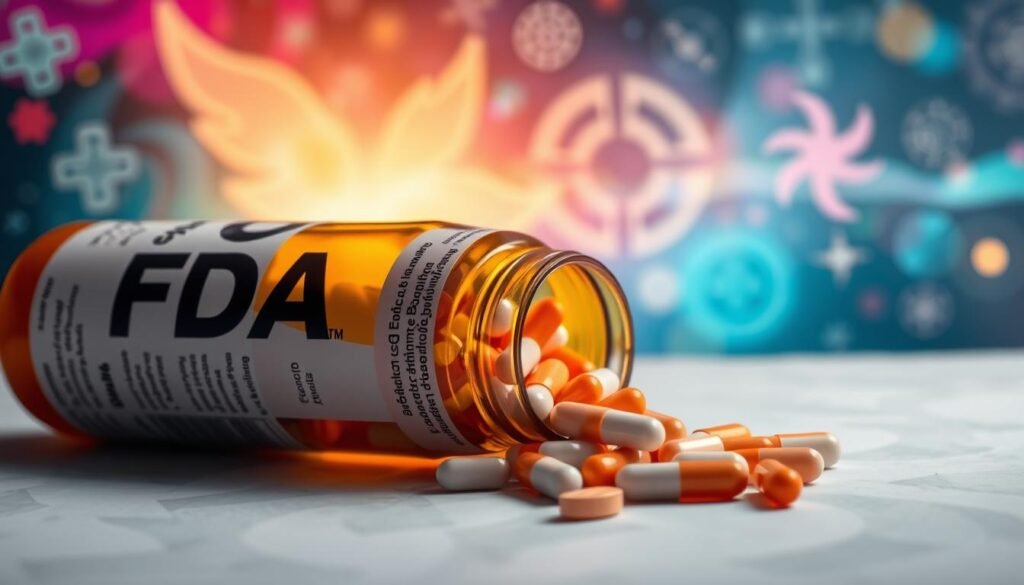It’s quite amazing that combining dextromethorphan and bupropion can help up to 70% of people with major depression. This combination beats many standard treatments. Dextromethorphan is usually a cough medicine. But now, it’s being looked at for its ability to lift depression. This guide dives into how dextromethorphan links with depression, cutting-edge studies, and key safety info for people exploring new mental health treatments.
Key Takeaways
- Dextromethorphan combined with bupropion shows promise in achieving high remission rates for depression.
- The onset of antidepressant effects can occur within just two weeks of treatment.
- Phase 3 clinical trials reveal dextromethorphan-bupropion outperforms placebo in reducing depressive symptoms.
- Common side effects include dizziness, nausea, and headaches, but are generally considered mild-to-moderate.
- The combination treatment is well-tolerated, both in short-term and long-term studies.
Introduction to Dextromethorphan and Depression
Dextromethorphan is often found in over-the-counter medicines like Robitussin and Nyquil. It is now being looked at for treating major depressive disorder (MDD). This new use could change how we help those with depression. Depression affects millions worldwide, making finding effective treatments crucial. Sadly, the first antidepressant works for just a third of people. Fewer than two-thirds find a working medication after trying four kinds.
Studies suggest dextromethorphan may work fast to lessen depression, similar to ketamine. Dextromethorphan’s recent approval with bupropion is a big step for mental health care. This duo was 11% more effective than placebo in trials, offering hope to those who did not benefit from standard treatments.
There is growing interest in how dextromethorphan could be key in combating MDD. Clinical trials have shown users of dextromethorphan/bupropion combo feeling better in just two weeks. This fast action meets a critical need for quicker solutions in antidepressant therapy.
Dextromethorphan Depression: Understanding the Connection
Dextromethorphan is gaining attention for its potential to help with depression. It acts as an NMDA receptor antagonist. This action affects how glutamate, a brain chemical, works.
Such effects are key in tackling depression’s root causes. Studies show that dextromethorphan, together with bupropion, can significantly improve depression. These findings suggest that this combination can make a difference for many people.
The Role of Dextromethorphan in Mental Health
Research into dextromethorphan shows it might have strong antidepressant benefits. This is particularly true for those who haven’t found relief elsewhere. A study with 97 patients found notable improvements in many by the sixth week.
The mix of dextromethorphan and bupropion worked better than bupropion alone. This indicates it could be a valuable option in treating mental health issues.
Potential Mechanisms Behind Antidepressant Effects
Dextromethorphan helps fight depression by blocking NMDA receptors and boosting glutamate transmission. This is a fresh approach compared to traditional treatments. Ongoing research supports dextromethorphan’s role in managing depression effectively.
For more about the history of how depression is diagnosed, check out this interesting article.

Current Pharmacological Treatments for Major Depression
In the field of mental health, antidepressants are key for treating major depression. Traditional medicines like SSRIs and SNRIs are widely used. However, they have significant drawbacks.
Limitations of Traditional Antidepressants
Patients often wait a long time to feel better with standard antidepressants. SSRIs and SNRIs may not help everyone. In fact, they fail to provide enough relief for many. This leads to a search for faster-acting medicines.
Need for Rapid-Acting Alternatives
There’s a growing need for treatments that work quicker. Medicines like esketamine and dextromethorphan-bupropion are promising because they act fast. For instance, dextromethorphan-bupropion can improve depression symptoms in just 1 to 2 weeks.
As we look for better treatments, these new options are changing how we manage depression. Recent research points out the need to thoroughly assess new therapies. This is because of the side effects associated with many antidepressants.

| Treatment | Onset of Action | Response Rate | Remission Rate | Common Side Effects |
|---|---|---|---|---|
| SSRIs/SNRIs | 4-6 weeks | 40-60% | 15-30% | Dizziness, nausea, dry mouth |
| Esketamine | Hours | N/A | N/A | Dizziness, nausea, anxiety |
| Dextromethorphan-bupropion | 1-2 weeks | 60.5% | 46.5% | Dizziness, nausea, dry mouth, decreased appetite |
The FDA Approval of Dextromethorphan-Bupropion Combination
The recent FDA approval of dextromethorphan-bupropion, known as Auvelity, is a big step for depression care. This blend has gone through tests to see its impact on major depressive disorder. Studies show it could greatly improve how we treat depression.
Clinical Trial Findings and Efficacy
The ASCEND trial’s phase 2 involved 80 people between 18 to 65 who had moderate to severe depression. They found that patients taking dextromethorphan-bupropion improved a lot. Their MADRS scores dropped -13.7 points after six weeks, more than those only on bupropion, which saw a drop of -8.8 points.
Some started to feel better by week 2 in the dextromethorphan-bupropion group.
Comparison to Placebo and Other Treatments
In the GEMINI phase 3 trial, 39.5% of patients on dextromethorphan-bupropion got much better compared to 17.3% with a placebo. Also, 54.0% of them responded well to treatment versus 34.0% on placebo. Even with side effects, Auvelity’s group did not have more issues like sexual dysfunction or gaining weight.

| Study | Participants | Remission Rate | Clinical Response Rate | Adverse Events (%) |
|---|---|---|---|---|
| ASCEND – Phase 2 | 80 | Not reported | Not reported | Not reported |
| GEMINI – Phase 3 | Not specified | 39.5% | 54.0% | 61.7% |
| Placebo Group | Not specified | 17.3% | 34.0% | 45.1% |
How Dextromethorphan Works in the Brain
Dextromethorphan has become important in treating depression. It works in unique ways in the brain. It targets NMDA receptor antagonism, which is key for mood regulation. Let’s dive deeper into how dextromethorphan helps fight depressive disorders.
NMDA Receptor Antagonism and its Effects on Depression
NMDA receptor antagonism is crucial for dextromethorphan’s antidepressant effects. It blocks these receptors and improves learning and memory. This process can balance the chemicals in the brain of those with depression. Studies show it could quickly help those who haven’t responded to other treatments, showing dextromethorphan’s promise.
Role of Glutamate and Neurotransmission
Glutamate is a key brain neurotransmitter and affects our mood. When it’s not balanced, mood disorders can appear. Dextromethorphan works on glutamate pathways, helping to bring back balance and lessen depression symptoms. It adjusts glutamate signals, strengthening brain connections that depression often weakens.
Dextromethorphan Depression Treatment Protocols
Using the dextromethorphan-bupropion combo right is key to fight depression effectively. It involves following exact dose guidelines and checking on patients regularly. This ensures they stay safe and get the best outcome from their treatment.
Dosage Guidelines and Administration
The usual start dose for dextromethorphan-bupropion is between 45 mg and 105 mg per day. It’s based on what works best for each person. Doctors should use official guides to pick the right dose. They might need to adjust it, watching how well it works and how it’s tolerated. Research shows these doses can really help reduce depression symptoms.
Monitoring and Adjustments in Treatment
Watching patients closely on this drug mix is critical. The start of treatment can bring more side effects and mental health shifts. Doctors should meet often with patients to see how they’re doing, handle any negative effects, and tweak the treatment if needed. This drug mix isn’t okay for people under 18 due to extra risks. It’s vital patients report big side effects like feeling sleepy or dizzy right away. Tracking progress helps in managing depression well while keeping risks low.
| Dosage (mg) | Response Rate (%) | Remission Rate (%) | Common Side Effects |
|---|---|---|---|
| 45 | 39 | 17.3 | Dizziness, Nausea |
| 105 | Over 39 | 70 | Drowsiness, Headache |
Safety and Tolerability of Dextromethorphan
It’s vital to understand how safe and tolerable dextromethorphan is for users. This drug can help with depression but knowing the dextromethorphan side effects is key.
Common Side Effects Experienced by Patients
In studies of dextromethorphan-bupropion, people reported various mild to moderate side effects. The most common ones were:
- Diarrhea (8.3%)
- Dizziness
- Dry mouth
- Fatigue
These dextromethorphan side effects show why watching for adverse reactions is important. Yet, the drug’s safety profile seems good when you consider how much it helps with depression.
Managing Adverse Effects in Clinical Settings
To make treatments better for patients, here are some tips:
- Regular Monitoring: Checking on patients often helps catch side effects early.
- Patient Education: Telling patients about side effects can make them less worried.
- Adjusting Dosage: Changing the dose might be needed if side effects are strong.
- Supportive Care: Giving care for mild side effects can make patients feel better.
Looking at safety profile and tolerability is crucial for using dextromethorphan well in treatments. Constant checks make sure patients get the most benefit while handling any side effects that come up.
Exploring the Risks: Dextromethorphan and Psychoactive Effects
Dextromethorphan (DXM) is found in OTC cough suppressants. It’s easy to get, especially for teens. It helps with coughs but using it wrongly can lead to serious mind-altering effects. People misuse it to feel high, see things, hear things, and change their mood. This is worrying because it might lead to addiction. Over time, they might need more to get the same effects.
Abuse Potential and OTC Drug Misuse
About 6.9% of teens admit to using DXM wrongly for its mind effects. The short-term effects range from feeling hyper to extreme fear or even psychosis. Those who use it a lot may need more to feel good. This raises their chances of taking too much. Mixing it with other drugs is very risky. It can lead to very dangerous health problems.
Harm Reduction Strategies in Treatment
It’s important to reduce these risks. Teaching doctors and patients about safe use and dangers is key. Treatments for DXM addiction look at both mind and body issues. By raising awareness and giving support, we can lower misuse. This will make using DXM safer for everyone.